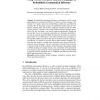Free Online Productivity Tools
i2Speak
i2Symbol
i2OCR
iTex2Img
iWeb2Print
iWeb2Shot
i2Type
iPdf2Split
iPdf2Merge
i2Bopomofo
i2Arabic
i2Style
i2Image
i2PDF
iLatex2Rtf
Sci2ools
108
Voted
CORR
2006
Springer
2006
Springer
Rational stochastic languages
In probabilistic grammatical inference, a usual goal is to infer a good approximation of an unknown distribution P called a stochastic language. The estimate of P stands in some class of probabilistic models such as probabilistic automata (PA). In this paper, we focus on probabilistic models based on multiplicity automata (MA). The stochastic languages generated by MA are called rational stochastic languages; they strictly include stochastic languages generated by PA; they also admit a very concise canonical representation. Despite the fact that this class is not recursively enumerable, it is efficiently identifiable in the limit by using the algorithm DEES, introduced by the authors in a previous paper. However, the identification is not proper and before the convergence of the algorithm, DEES can produce MA that do not define stochastic languages. Nevertheless, it is possible to use these MA to define stochastic languages. We show that they belong to a broader class of rational serie...
CORR 2006 | Education | Probabilistic | Probabilistic Grammatical Inference | Stochastic Languages |
Related Content
| Added | 11 Dec 2010 |
| Updated | 11 Dec 2010 |
| Type | Journal |
| Year | 2006 |
| Where | CORR |
| Authors | François Denis, Yann Esposito |
Comments (0)

